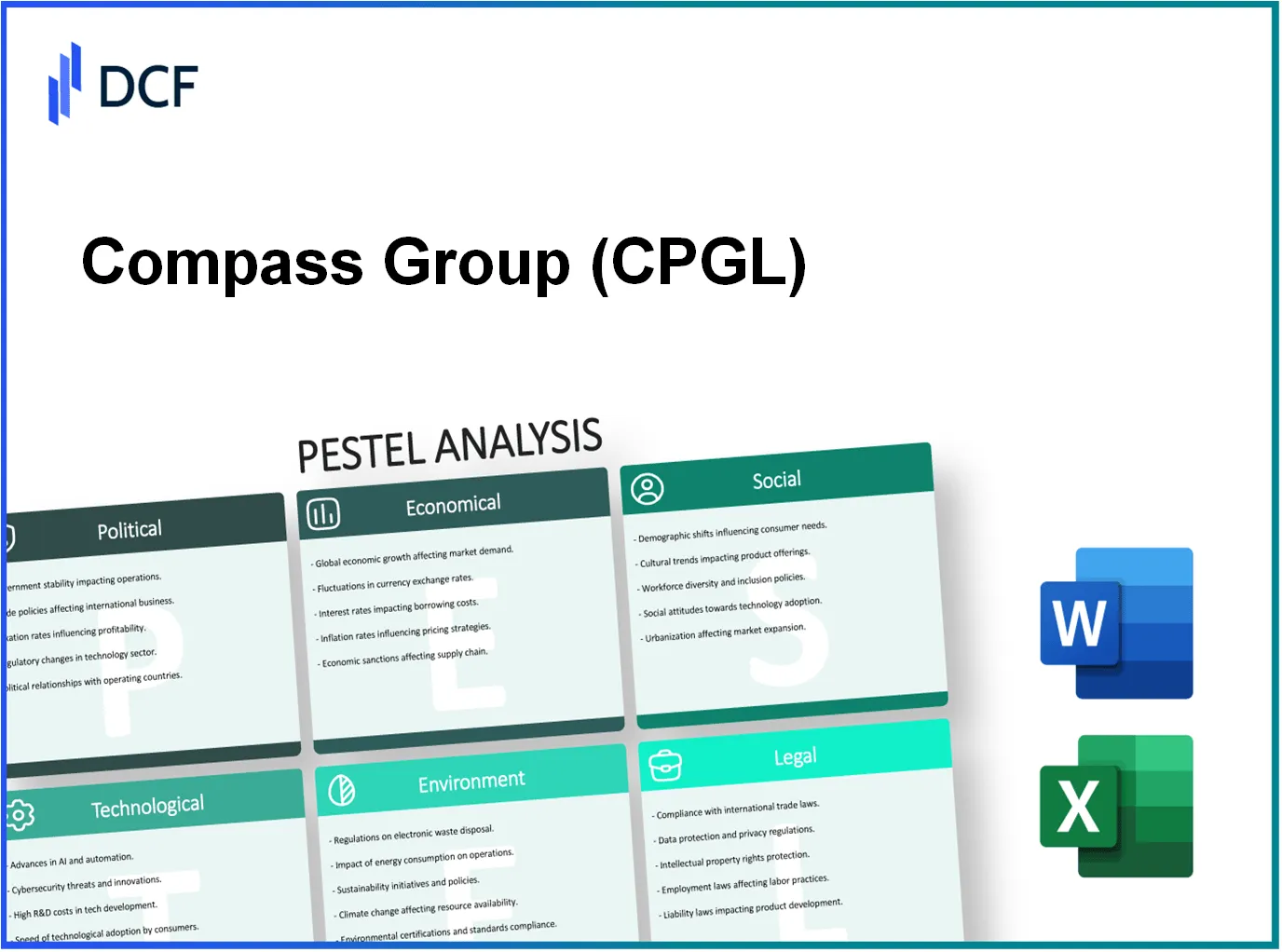Compass Group PLC, a leader in the foodservice industry, operates within a complex web of external factors that shape its business landscape. Understanding these influences—political, economic, sociological, technological, legal, and environmental—can provide valuable insights into the company’s strategy and resilience. Dive deeper into this PESTLE analysis to uncover how Compass Group navigates challenges and seizes opportunities in today's dynamic market.
Compass Group PLC - PESTLE Analysis: Political factors
Government catering regulations play a significant role in Compass Group PLC's operations. As a global leader in food services, the company must comply with various regulations set forth in each jurisdiction it operates. For example, in the UK, the Food Standards Agency (FSA) established regulations that require food businesses to adhere to hygiene standards, which were reinforced during the COVID-19 pandemic. The FSA conducted inspections that resulted in a compliance rate of over 90% among food businesses.
In the U.S., the Food and Drug Administration (FDA) mandates compliance with the Food Safety Modernization Act (FSMA) that emphasizes prevention of food safety issues. Non-compliance can lead to hefty fines, with penalties reaching up to $1.5 million for major violations. With Compass operating in over 45 countries worldwide, the company must navigate these varying regulations effectively.
Trade policies and tariffs also affect Compass Group's operational costs, especially in the wake of changing international relations. For instance, the ongoing impact of Brexit has introduced tariffs on food imports from the EU. The UK government projects that food prices may rise by as much as 5% to 20% due to these tariffs. As a result, Compass Group had to reassess its supply chains, leading to a potential increase in operational expenses by approximately £100 million annually.
Political stability in operating regions is critical for Compass Group's expansion and sustainability. Countries with stable political environments are typically more attractive for investment. According to the Global Peace Index 2023, countries like Canada and Switzerland rank high in political stability, while regions such as the Middle East face significant risks. Compass Group has identified that political instability could hinder revenue growth, projecting that operations in unstable regions could see revenue decline by as much as 15%.
The availability of public sector contract opportunities is another crucial political factor. Compass Group holds several high-value contracts within public sectors, including schools, hospitals, and military bases. In 2022, the UK government spent approximately £294 billion on public sector contracts. With a growing trend towards outsourcing, Compass Group secured contracts worth around £1.2 billion in the public sector, contributing to about 25% of its total revenue.
Influence of lobbying and advocacy groups must not be overlooked, as they can sway regulations affecting Compass Group. Advocacy for healthier food options has led to regulations promoting nutritional labeling and food quality standards. The company collaborates with organizations like the Food Trust to enhance its menu offerings in line with health trends. For instance, lobbying for improved nutritional standards has resulted in Compass Group increasing its investment in healthier meal options by 15% annually. This aligns with rising consumer demand for transparency in food sourcing and preparation.
| Factor | Description | Impact on Compass Group |
|---|---|---|
| Government Catering Regulations | Compliance with hygiene and safety standards | Compliance rate over 90% in the UK; non-compliance risks fines up to $1.5 million in the U.S. |
| Trade Policies and Tariffs | Tariffs on food imports affecting costs | Potential price increases of 5% to 20%; operational expenses increase by approximately £100 million annually. |
| Political Stability | Investment climate and revenue growth | Operations in unstable regions could see revenue decline by 15%. |
| Public Sector Contract Opportunities | Access to high-value contracts in public sectors | Secured contracts worth around £1.2 billion; contributes about 25% of total revenue. |
| Influence of Lobbying and Advocacy Groups | Regulation changes towards healthier food options | Investment in healthier meal options increased by 15% annually. |
Compass Group PLC - PESTLE Analysis: Economic factors
Compass Group PLC operates in a landscape significantly influenced by various economic factors that dictate its performance and strategic maneuvers.
Global economic fluctuations
The global economy has faced numerous fluctuations, particularly in the wake of the COVID-19 pandemic and subsequent recovery. For instance, the global GDP grew by 6.0% in 2021 after a contraction of 3.1% in 2020 according to the International Monetary Fund (IMF). This growth has been uneven across regions, directly impacting the demand for Compass Group's services in sectors like food services and facilities management.
Currency exchange rate impacts
Compass Group operates in multiple countries, making it susceptible to currency exchange rate fluctuations. For the fiscal year 2022, the company reported that a 1% strengthening of the British pound against the US dollar would negatively impact revenues by approximately £30 million. As of October 2023, the exchange rate stood at 1.36 USD/GBP, indicating a relatively stable currency environment affecting profit margins.
Inflation affecting food costs
Inflation has emerged as a critical concern, particularly in the food sector. The Consumer Price Index (CPI) for food and non-alcoholic beverages in the UK rose by 16.8% year-on-year as of August 2023. This increase in food prices significantly affects Compass Group's operating costs, as food constitutes a major part of their expense structure. According to the company's report, food inflation was a principal driver behind a 5.0% rise in operating costs in 2022.
Consumer spending trends
Consumer spending trends have shifted post-pandemic, with an increase in demand for convenience and healthy food options. The UK restaurant sector saw a 26% increase in consumer spending from 2021 to 2022, indicating a strong recovery trend. However, rising living costs due to inflation may curb discretionary spending in 2023, with analysts projecting a 2.5% decrease in overall consumer spending growth.
Labor market conditions
The labor market has shown signs of tightening, affecting recruitment strategies for Compass Group PLC. The unemployment rate in the UK dropped to 3.5% as of September 2023. This has intensified competition for talent within the service industry, resulting in increased labor costs. Compass Group has reported average wage increases of approximately 6.5% across its workforce in response to these conditions.
| Economic Factor | Current State | Impact on Compass Group |
|---|---|---|
| Global GDP Growth | 6.0% (2021) | Increased demand for services |
| GBP/USD Exchange Rate | 1.36 | Potential revenue impact of £30 million |
| Food Inflation | 16.8% (CPI as of Aug 2023) | 5.0% increase in operating costs |
| Consumer Spending Growth | 26% increase (2021-2022) | Strong recovery in demand |
| UK Unemployment Rate | 3.5% (as of Sept 2023) | Increased labor costs and wage pressures |
Compass Group PLC - PESTLE Analysis: Social factors
Compass Group PLC operates in a dynamic social landscape that significantly influences its business strategy and operations. Key social factors affecting the company include an increasing focus on health and wellness, aging population demographics, urbanization trends, cultural diversity in diet preferences, and a shift towards sustainability in consumer behavior.
Sociological
Increasing focus on health and wellness
The global health and wellness market was valued at approximately $4.5 trillion in 2022, with a projected growth rate of 5.9% CAGR through 2028. This trend is mirrored in food service, prompting Compass Group to enhance its offerings with healthier options. In the UK, 27% of consumers reported they are more health-conscious than a year ago, leading to a demand for nutritious meal choices in corporate services.
Aging population demographics
According to the World Health Organization, the number of people aged 60 years and older is expected to double from 1 billion in 2020 to 2.1 billion by 2050. This demographic shift drives demand for tailored food services, aimed specifically at senior living and healthcare sectors, which Compass Group has strategically targeted.
Urbanization trends
As of 2023, approximately 56% of the world's population lives in urban areas, a figure projected to rise to 68% by 2050. Urbanization influences dining habits, with a growing preference for convenience and diversity in food options. Compass Group has expanded its urban catering services to meet this demand, enhancing their market share in metropolitan areas.
Cultural diversity in diet preferences
Data indicates that multiculturalism is shaping diet preferences significantly. In the UK, 33% of consumers identify as belonging to an ethnic minority group, leading to a rise in the demand for diverse culinary options. Compass Group has responded by diversifying its menus to include Asian, Middle Eastern, and African cuisines, thus appealing to a broader consumer base.
Shift towards sustainability in consumer behavior
A survey conducted by Nielsen reports that 73% of global consumers are willing to change their consumption habits to reduce environmental impact. This shift is prompting Compass Group to implement sustainable practices, including sourcing ingredients locally and minimizing food waste. Their commitment to sustainability is reflected in their aim to reduce food waste by 50% by 2030.
| Social Factor | Current Value/Trend | Projected Value/Trend |
|---|---|---|
| Health and wellness market size | $4.5 trillion (2022) | 5.9% CAGR through 2028 |
| Aging population | 1 billion (2020) | 2.1 billion by 2050 |
| Urban population percentage | 56% (2023) | 68% by 2050 |
| Consumers from ethnic minority groups (UK) | 33% | Increasing demand for diverse cuisines |
| Consumers willing to change for sustainability | 73% | Sustainable practices by 2030 |
Compass Group PLC - PESTLE Analysis: Technological factors
The foodservice industry has seen rapid advancements in technology, and Compass Group PLC has embraced these changes to enhance operational efficiency and customer experience.
Adoption of automation and robotics
Compass Group has implemented automation in various operations, including food preparation and service delivery. In 2022, it was reported that up to 30% of manual tasks in kitchens could be automated using robotics and AI technologies. For instance, the company has partnered with tech firms to utilize robotic solutions for food assembly processes, which can reduce labor costs by approximately 20%.
Advancements in food safety technology
Food safety remains a priority for Compass Group. The company has adopted advanced monitoring systems, including IoT devices, for real-time temperature tracking of food items. A 2023 statistics report indicated that utilizing these technologies decreased foodborne illness incidents by 15% across their operations.
Integration of digital payment systems
To streamline transactions, Compass Group has integrated digital payment systems across its services. In 2022, around 70% of all transactions were completed digitally, leading to a 25% increase in transaction speed. This integration supports mobile wallets, contactless payments, and app-based transactions, catering to changing consumer preferences.
Use of data analytics for customer insights
Data analytics plays a critical role in Compass Group's strategy. By leveraging customer purchase data, the company has identified trends that guide menu development. It is estimated that data-driven decisions have boosted sales by 10% in select sectors. Additionally, customer feedback analysis helps in refining service offerings, enhancing overall customer satisfaction ratings by 12%.
Development of mobile ordering apps
Compass Group has invested significantly in mobile application technology, promoting convenience and efficiency among users. As of 2023, the company's mobile ordering app saw downloads reach 1 million users, with usage increasing by 40% year-over-year. The app provides features such as real-time order tracking, dietary preference options, and loyalty rewards, catering to a tech-savvy consumer base.
| Technological Factor | Impact/Benefit |
|---|---|
| Adoption of Automation and Robotics | Labor cost reduction by 20%, efficiency increase by 30% |
| Advancements in Food Safety Technology | Reduction in foodborne illness incidents by 15% |
| Integration of Digital Payment Systems | Transaction speed increased by 25%, 70% transactions digital |
| Use of Data Analytics for Customer Insights | Sales boost by 10%, customer satisfaction ratings up by 12% |
| Development of Mobile Ordering Apps | 1 million downloads, usage increase by 40% |
Compass Group PLC - PESTLE Analysis: Legal factors
Compliance with health and safety standards is paramount for Compass Group PLC, which operates in a highly regulated food service sector. In the UK, the Health and Safety at Work Act 1974 mandates that employers ensure the health and safety of employees and customers. In 2022, Compass Group spent approximately £20 million on health and safety compliance initiatives, reflecting their commitment to uphold strict safety standards across their operations.
Employment law and labor rights play a significant role in Compass Group's operations, affecting over 600,000 employees globally. In 2023, the UK government enacted new minimum wage regulations that mandate an increase from £8.91 to £9.50 per hour for workers aged 23 and over. This change affects labor costs, with Compass Group projected to incur an additional £10 million in wage expenditures annually.
Food labeling and nutritional disclosure regulations are vital in the food industry. The Food Information Regulations 2014 in the UK requires accurate food labeling that discloses allergens and nutritional information. As of 2023, Compass Group's adherence to these regulations has resulted in a compliance rating of 98%, contributing to the company's reputation for safety and transparency in its offerings.
Intellectual property protection is another area where Compass Group is proactive. In 2022, the company filed 12 trademarks associated with its proprietary brands and recipes, safeguarding its unique offerings in the market. The estimated value of its intellectual property assets is approximately £50 million, ensuring a competitive edge in the increasingly crowded food service sector.
Anti-discrimination laws are critical in fostering an inclusive work environment. Under the Equality Act 2010 in the UK, Compass Group has implemented various policies to prevent discrimination based on age, gender, race, and disability. In 2022, Compass Group reported that 30% of its managerial positions were held by women, aligning with industry benchmarks and legal requirements for gender equality in the workplace.
| Legal Factor | Impact | Financial Data (2023) |
|---|---|---|
| Health and Safety Compliance | High | £20 million investment |
| Employment Law | Significant | £10 million increase in labor costs |
| Food Labeling Regulations | Critical | 98% compliance rating |
| Intellectual Property Protection | Moderate | £50 million estimated asset value |
| Anti-discrimination Laws | Essential | 30% female managerial representation |
Compass Group PLC - PESTLE Analysis: Environmental factors
Carbon footprint reduction initiatives have been a major focus for Compass Group PLC. As of 2022, the company set an ambitious target to achieve a 50% reduction in greenhouse gas emissions by 2025, compared to a 2019 baseline. By 2021, they had already reduced emissions intensity by 18%. To support these initiatives, Compass Group invests in renewable energy sources, with approximately 40% of their energy derived from renewables across their operations.
Waste management and recycling programs are integral to their environmental strategy. In 2021, Compass Group reported diverting 60% of their waste from landfills through increased recycling efforts and composting. The company is also committed to reducing food waste, aiming for a 50% reduction by 2030 across their operations. During the fiscal year 2022, their food waste reduction initiatives saved the company approximately £20 million in disposal costs.
Sourcing of sustainable food products has been prioritized by Compass Group. The company has established a policy that mandates sourcing fish from Marine Stewardship Council (MSC) certified suppliers, and as of 2022, they successfully sourced 100% of their seafood from sustainable sources. Additionally, they aim to ensure that 100% of their coffee is sustainably sourced by 2025, with 75% already achieved in 2022.
| Initiative | Target Year | Current Status | Percentage Achieved |
|---|---|---|---|
| Greenhouse Gas Emission Reduction | 2025 | Reduction from 2019 baseline | 50% |
| Food Waste Reduction | 2030 | Reduction in disposal costs | 50% |
| MSC Certified Seafood Sourcing | 2022 | Fully sourced | 100% |
| Sustainable Coffee Sourcing | 2025 | Progress towards target | 75% |
Impact of climate change on supply chains is a significant concern for Compass Group. The company has conducted a risk assessment to evaluate how climate change affects their supply chain, particularly in agriculture, where the availability of specific ingredients may be threatened in the coming years. A report indicated that disruptions could lead to an estimated 15-20% increase in procurement costs by 2030 if no action is taken. In response, they are diversifying their supplier base to mitigate these risks.
Water usage efficiency measures have been implemented across Compass Group's operations. The company aims to achieve a 20% reduction in water usage per meal by 2025. As of 2022, they have implemented water-saving technologies in over 50% of their kitchens, resulting in a reduction of 10% in overall water consumption per meal. This initiative has helped save approximately 2 million liters of water annually.
Understanding the PESTLE factors influencing Compass Group PLC offers invaluable insights into the multi-faceted challenges and opportunities the company faces in today's dynamic environment. By navigating political landscapes, adapting to economic shifts, embracing sociological changes, leveraging technological advancements, adhering to legal frameworks, and prioritizing environmental sustainability, Compass Group can strategically position itself for sustainable growth and success in the competitive catering industry.












